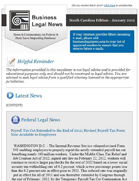
Sole Proprietorship
Please click the question to view the answer.
What are the primary advantages of a sole proprietorship?
What are the primary disadvantages of a sole proprietorship?
What are the primary advantages of a sole proprietorship? back to top
The sole proprietorship is the easiest business entity to organize. For this reason, it is also the most common business form. As the name suggests, a sole proprietorship consists of an individual owner. For legal and taxation purposes the owner is the business. A sole proprietor generally acknowledges his or her two-fold nature, as an individual and business, when entering into a contract by following his or her name with the designation “d.b.a.” (“doing business as”) followed by the trade name the sole proprietor is using. For example:
John Doe d.b.a. Universal Landscaping
Simplicity, completeness of control, and flexibility are the most appealing advantages of the sole proprietorship form. The sole proprietor is the sole decision maker. Unlike with many partnerships, corporations, and limited liability companies, no statutorily imposed formalities govern its structure. Accounting and administrative advantages also flow to the sole proprietor insofar as business profits, expenses, and losses are taxed or deducted at the level of the sole proprietor’s individual income. Thus, the sole proprietor may withdraw money directly from the business bank account on an as-needed basis without the need to pay a regular salary or wage. While this may not be a good practice for accounting purposes, it does reflect the fact that profit to the business is automatically deemed profit to the individual. Similarly, the sole proprietor may add his or her personal capital to the business bank account without the same formal recording requirements that govern capital contributions for other business forms. For business accounting reasons, however, such casual practices should be avoided.
What are the primary disadvantages of a sole proprietorship?
back to top
When contemplating the sole proprietorship business form, you will want to keep in mind that all of your personal and business assets will be at risk. Legal judgments against a sole proprietorship (whether based on tort or contract liability) will be levied against your business and personal assets because there is no legal distinction between your business obligations and your personal obligations. You are, therefore, subject to unlimited personal liability. Come judgment day in federal or state court, you might risk losing much of what you own, with certain statutory exemptions depending on your state of residence.
If you have not accumulated much personal wealth, you may feel less threatened by unlimited liability. You may attempt to mitigate your personal liability through insurance coverage for certain types of losses. In consultation with a competent business lawyer and professional insurance agent, you must consider to what extent your business activities might put you at risk and the cost of insurance premiums to cover likely risks at appropriate levels of coverage. While insurance coverage will need to be a part of nearly every comprehensive business plan, insurance will not cover contractual debts of the business, such as lease obligations, nor will it cover liabilities that are outside of, or exceed, its coverage.
Other factors which may negatively impact your decision to initially carry out your business activities as a sole proprietorship include the inability to transfer or sell a partial economic interest in the business and remain a sole proprietor. Doing so will automatically change your business form, most typically to a general partnership. Moreover, a sole proprietorship lacks the kind of continuity in form that a corporation or limited liability company might have. If the sole proprietor dies while in business, the business ceases to exist, though the assets of the business may be sold or transferred by his or her estate. Other advantages and limitations to being a sole proprietorship are found in the area of taxation.
Get answers now to your important legal questions and concerns.

Copyright © 2009- Small Business Law Firm, LLC. All Rights Reserved. This document is protected by U.S. and International Copyright Laws. You agree that use of these materials are restricted to authorized users (current and prospective clients only) and shall not be used for other commercial purposes without the express written permission of the Small Business Law Firm, LLC.
By using this website, you agree to read the important legal notices and disclaimers and be bound by the terms and conditions set forth in the Legal Disclaimer section and other sections of this website. Should a dispute arise with regard to your use of the contect of this website, you expressly agree to be subject to the the jurisdiction of the State of South Carolina
Small Business Law Firm, LLC
Serving South Carolina: Columbia(main office), Charleston, Greenville(satellite office appointments by prior agreement & by virtual services), other SC Locations (virtual services only)

















Follow us